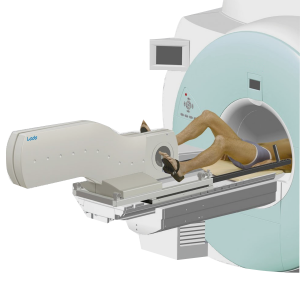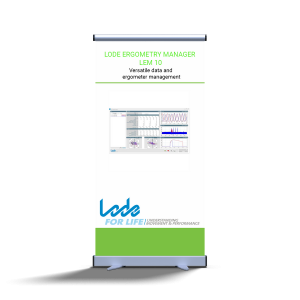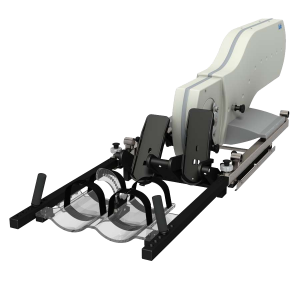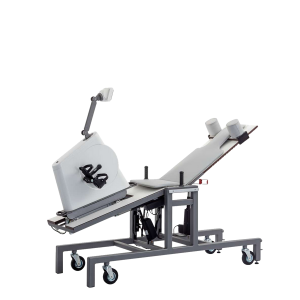MR Ergometer Up/Down
Allows for use in MR with Up/Down movement
This MI ergometer is suitable for spectroscopy. The patient is laying in the scanner with the total body. The workload is adjustable up to 100 watt. The zero load is <5 watt at 25 rpm. The MRI ergometer is an ergometer for use during MR studies. The MR ergometers workload is controlled with an electronical braking principle especially designed for use in a MR environment. The moment of inertia is 8,4 kgm2. The MR ergometer is standard supplied with a control unit and power unit. The standard control unit offers the possibility to read out various parameters like workload, rpm, torque, timer and distance. The power unit is completed with a safety cable for wallfixation. The MR ergometer can be used for MR scanners up to 3 Tesla
Overview
Highlights
Unique ergometer for MRI
High standards
Tesla independent
Exercise instead of medicine
Compatible with various MRIs at 1.5 and 3 Tesla
– Philips
– Siemens
– GE
Features
Up till 3 Tesla
Siemens MRI compatibility
Philips MRI compatible
like Philips Achieva and Ingenia.
GE MRI compatible
Extreme low start up load
Low noise
Service friendly ergometer
Accurate over a long period of time
Small adjustment steps
Additional features with PCU
– better monitoring because of the additional and larger display
– a perfect combination with BPM
– possibility to measure SpO2
Accessories
Specifications
| Maximum speed | 106 km/h | 65.9 mph | maximum speed of the treadmill |
| Minimum load | 5 W | the minimum load the ergometer can provide | |
| Maximum peak load | 100 W | the maximum load the ergometer can provide for a short period of time | |
| Minimum load increments | 1 W | the smallest steps with which the load can be added | |
| Maximum continuous load | 100 W | the maximum power the ergometer can deliver continuous | |
| Hyperbolic workload control | control of workload in hyperbolic way | ||
| Linear workload control | control ergometer in a linear way | ||
| Fixed torque workload control | control ergometer in a fixed torque way | ||
| Maximum rpm independent constant load | 60 rpm | rpm as to which constant load can be applied | |
| Minimum rpm independent constant load | 5 rpm | rpm as from which constant load can be applied | |
| Optional heart rate controlled workload | control the device optionally through a set heartrate | ||
| Electromagnetic "eddy current" braking system | system that very accurately applies a brake to the ergometer | ||
| Dynamic calibration | continuous calibration during application of workload |
| Workload accuracy below 100 W | 3 W | accuracy of the ergometer below 100 Watt load | |
| Workload accuracy from 100 to 500 W | 3 % | accuracy of the ergometer between 100 and 500 Watt |
| Manual operation mode | Operate manually | ||
| Preset protocol operation mode | Operate via preset protocols | ||
| Analog operation mode | operate analog | ||
| External control unit | a control unit is connected with a cable to the ergometer | ||
| Selfdesigned protocol operation mode | operate via selfdesigned protocols |
| Analog connector | read-out of ergometer load in an analog way |
| Product length (cm) | 135 cm | 53.1 inch | length of product in cm |
| Product width (cm) | 50 cm | 19.7 inch | width of the product in cm |
| Product height | 50 cm | 19.7 inch | height of product |
| Product weight | 47 kg | 103.6 lbs | the weight of the product |
| 115 V AC 50/60 Hz (130 VA) | operational power | ||
| 230 V AC 50/60 Hz (130 VA) | operational power |
| IEC 60601-1:2005 | the product is IEC 60601-1 3rd edition compliant | ||
| ISO 13485:2016 compliant | Lode fulfils ISO 13485:2016 requirements | ||
| ISO 9001:2015 compliant | Lode fulfills ISO 9001: 2015 requirements |
| CE class Im according to MDD93/42/EEC | CE certified | ||
| CB according to IECEE CB | CB certified |
| Maximum operational temperature | 40 °C | maximum temperature at which the device will work within specification | |
| Minimum operational temperature | 14 °C | minimum temperature at which the device will work within specification | |
| Maximum operational air pressure | 106 kPa | maximum air pressure as from which the product will be operating within specification | |
| Maximum operational non-condensing humidity | 90 % | maximum non-condensing humidity at which the product will operate within specification | |
| Minimum operational non-condensing humidity | 10 % | minimum non-condensing humidity at which the product will operate within specification | |
| Maximum storage & transport temperature | 70 °C | maximum temperature the product may be stored or transported at | |
| Minimum storage & transport temperature | -25 °C | minimum temperature the product may be stored and transported at | |
| Maximum storage & transport air pressure | 106 kPa | maximum air pressure the product may be stored and transported at | |
| Max. humidity storage & transport | 95 % | max. non-condensing humidity that the product can be stored or transported at | |
| Min. humidity storage & transport | 10 % | minimum non-condensing humidity that the product can be stored or transport at |
*Specifications are subject to change without notice.
Science
Science
- Accelerated cardiac MR stress perfusion with radial sampling after physical exercise with an MR-compatible supine bicycle ergometer.
- An MR-Compatible Treadmill for Exercise Stress Cardiac Magnetic Resonance Imaging
- Arm exercise as an alternative to pharmacologic stress testing: arm exercise stress testing and outcome
- Assessing exercise cardiac reserve using real-time cardiovascular magnetic resonance
- Assessing vascular response to exercise using a combination of real-time spiral phase contrast MR and noninvasive blood pressure measurements
- Atrial volume and function during exercise in health and disease
- Automatic segmentation propagation of the aorta in real-time phase contrast MRI using nonrigid registration.
- Biventricular response to supine physical exercise in young adults assessed with ultrafast magnetic resonance imaging
- Calf Muscle Perfusion at Peak Exercise in Peripheral Arterial Disease: Measurement by First-Pass Contrast-Enhanced Magnetic Resonance Imaging
- Cardiac MRI: a new gold standard for ventricular volume quantification during high-intensity exercise
- Characterizing blood oxygen level-dependent (BOLD) response following in-magnet quadriceps exercise
- Design and testing of an MRI-compatible cycle ergometer for non-invasive cardiac assessments during exercise
- Dynamic bicycle exercise to assess cardiac output at multiple exercise levels during magnetic resonance imaging
- Effect of Fontan geometry on exercise haemodynamics and its potential implications
- Effect of respiration on cardiac filling at rest and during exercise in Fontan patients: A clinical and computational modeling study
- Effects of Exercise and Respiration on Blood Flow in Total Cavopulmonary Connection
- Exercise capacity in single-ventricle patients after Fontan correlates with haemodynamic energy loss in TCPC
- Exercise stress CMR reveals reduced aortic distensibility and impaired right-ventricular adaptation to exercise in patients with repaired tetralogy of Fallot
- Feasibility and Reproducibility of Biventricular Volumetric Assessment of Cardiac Function During Exercise Using Real-Time Radial k-t SENSE Magnetic Resonance Imaging
- Flow during exercise in the total cavopulmonary connection measured by magnetic resonance velocity mapping.
- Heart Journal
- High-resolution phase-contrast MRI of aortic and pulmonary blood flow during rest and physical exercise using a MRI compatible bicycle ergometer
- High-resolution phase-contrast MRI of aortic and pulmonary blood flow during rest and physical exercise using a MRI compatible bicycle ergometer.
- Improving the physiological realism of experimental models.
- Interaction between respiration and right versus left ventricular volumes at rest and during exercise: a real-time cardiac magnetic resonance study
- Leg lean mass correlates with exercise systemic output in young Fontan patients.
- Measurement of aortic and pulmonary flow with MRI at rest and during physical exercise.
- MR augmented cardiopulmonary exercise testing-a novel approach to assessing cardiovascular function.
- MRI evaluation of left ventricular volume in children and adults during in-scanner exercise.
- Paradoxical Increase in Ventricular Torsion and Systolic Torsion Rate in Type I Diabetic Patients Under Tight Glycemic Control FREE
- Peripheral arterial disease assessment: wall, perfusion, and spectroscopy
- Quantitative abdominal aortic flow measurements at controlled levels of ergometer exercise
- Respiratory Effects on Fontan Circulation during Rest and Exercise Utilizing Real Time Cardiac Magnetic Resonance Imaging
- The effect of supine exercise on the distribution of regional pulmonary blood flow measured using proton MRI
- The response of the pulmonary circulation and right ventricle to exercise: exercise-induced right ventricular dysfunction and structural remodeling in endurance athletes
Support
The MRI ergometer is compatible with Siemens, GE and Philips MRI scanners. The type of movement (up-down, push-pull or circular) is depending on the diameter of the scanner and the kind of research (cardiac, spectroscopy etc)
Your Lode ergometer is standard supplied with one display. The contrast of this display is factory set and can adjusted by qualified service personal only. If your ergometer is supplied with a programmable option the contrast of this display can be set as follows: go to SYSTEM PARAMETERS select SETTINGS go to CONTRAST. Change the visability according your wishes and save the changes.
Yes, since January 2010 all Lode MRI ergometers are compatible with MRI scanners up to 3 Tesla
Not sure what this means? Contact us and we will help you to get the right converter.
Service
Part number
937903
Interfacing
Interfacing protocols






Reviews
There are no reviews yet.